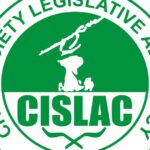On our part we have provided the necessary soaps, sanitisers and hard-surface disinfectants to ensure compliance
Acting President of the Court of Appeal, Justice Monica Dongban-Mensem
The lockdown and restriction of movements across the country to contain the spread of the COVID-19 pandemic has continued to receive mixed reactions from different legal and human rights groups in the country.
While some are of the view that the lockdown is illegal without the approval of the National Assembly, others believe that the panic created over the pandemic is unnecessary and could hurt the country’s economy. Still others believe the lockdown legal.
President Muhammadu Buhari had in a nationwide broadcast on the COVID-19 pandemic on March 29, 2020, announced the restriction of movement in the FCT, Lagos and Ogun states for an initial period of 14 days.
He said, “Based on the advice of the Federal Ministry of Health and the NCDC, I am directing the cessation of all movements in Lagos and the FCT for an initial period of 14 days with effect from 11pm on Monday, 30th March 2020. This restriction will also apply to Ogun State due to its close proximity to Lagos and the high traffic between the two states.”
Lockdown illegal – Adegboruwa
Lagos-based human rights lawyer, Ebun Adegboruwa (SAN), said President Muhammadu Buhari lacked constitutional powers to restrict movement of people in the face of the coronavirus pandemic.
He argued that having not invoked his constitutional powers to declare state of emergency which must be approved by the National Assembly, the president could not legally make the restriction.
“We are running a constitutional democracy and it is illegal for the president to take over the affairs of any state of the federation without the express consent of the people of that state through their elected representatives,” he said.
Also, National Human Rights Commission (NHRC) through its Executive Director, Anthony Ojukwu, warned law enforcement agencies against violation of the rights of Nigerians in the enforcement of the lockdown announced by the federal government.
Lockdown causing much ‘panic’ -NGOs
Two non-governmental organisations have criticised the measures adopted by the federal government as part of the lockdown to curb the spread of the COVID-19 pandemic.
In their statements on Wednesday, Charles Onunaiju of the Centre for China Studies (CCS) and Nnamdi Ahaiwe of Civil Society Observatory for Constitutional and Legal Compliance (CSOCLC) called for the adoption of local measures to tackle the pandemic.
Onunaiju warned that “While all measures including the unorthodox ones of social distancing, isolation, quarantine and even lockdown, though, to be graduated and targeted, would feature in the range of options to curb, control and contain the spread of the virus, key issue is now to appreciate that scientific research is the most valuable fundamental to confront this kind of strange outbreak.”
In the same vein, Ahaiwe said the panic over the COVID-19 was unnecessary and could adversely affect the country’s economy.
“Still looking at the empirical numbers, the Nigerian Malaria Fact Sheet says there are over 300,000 deaths from malaria per year compared to about 215,000 deaths from HIV/AIDS.
“Malaria and HIV/AIDS alone account for 515,000 deaths each year in Nigeria. By the time you add deaths from typhoid, Lassa fever, measles, tuberculosis, road accidents, Boko Haram and other causes, you are talking about millions of deaths from diseases and other preventable causes each year,” he said.
“Yet in the three months plus that COVID-19 entered our dictionary, only five persons have died of it in Nigeria and assuming there is massive outbreak, the trajectory in figures and data show that probably less than 5,000 people, mostly the elderly and those with underlying conditions would die,” he added.
Lockdown legal and constitutional – Malami, Gudaji
Reacting, the Attorney General of the Federation and Minister of Justice, Abubakar Malami (SAN) said Adegboruwa was wrong and misconstrued the constitution and failed to point out the constitutional provisions which were breached by the president in his action.
“Community reading of sections 5, 14, 20 and 45 of the 1999 Constitution of the Federal Republic of Nigeria and Section 2, 6 and 8 of the Quarantine Act and Article 4 of the International Covenant on Civil and Political Rights and Article 11 on Human and Peoples Right make the declaration by His Excellency the President, valid, legal and enforceable,” he said.
“It is important to inform the discerning members of the public that the President did not make a declaration of a State of Emergency under Section 305(1) of the 1999 Constitution (as amended) which would have required the concurrence of both House of the National Assembly. Even at that, Section 305(6)(b) of the 1999 Constitution (as amended) permits a proclamation of a State of Emergency to run for a period of 10 days without the approval of the National Assembly when the parliament is not in session as in the present situation wherein the National Assembly has shut down.”
Similarly, a legal practitioner, Hamza Gudaji said Section 4(c) and (d) of the Quarantine Act LFN 2004 and Section 45 (1) of the Nigerian Constitution contain clear and unequivocal enabling provisions for the restriction of movement of citizens, whether infected or uninfected persons.
He said, “Section 45 (1) of the Constitution allows a derogation from the constitutionally guaranteed right of movement provided under Section 41 thereof, by way of a law that is reasonably justifiable in a democratic society in the interest of defence, public safety or public health, or for the purpose of protecting the rights and freedom of other persons.”
He submitted that the argument that the restriction of movement of citizens pursuant to the Quarantine Act supra., will amount to an erosion of a benefit given to them under the same law, is misplaced and an over-simplistic way of understanding what is beneficial to the citizens in this period of public health emergency of a potentially existential nature.
“In addition to all of the foregoing, it is stated that the regulations anticipated by Section 4 of the Quarantine Act supra., are also aimed at preventing the spread and transmission of an infectious disease, clearly showing that the subject of such a regulation could be persons not infected, especially in a situation where asymptomatic carriers or vectors of COVID-19 are not readily and easily identifiable and that the restriction of movement is medically the most potent line of action of stopping the spread and transmission of the disease,” he added.



